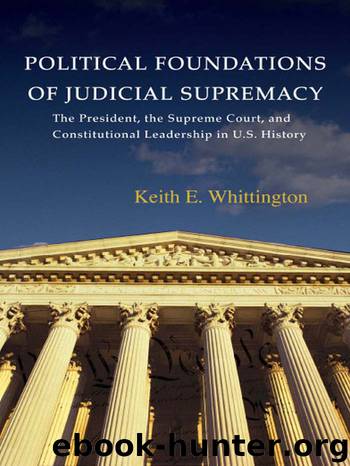Political Foundations of Judicial Supremacy by Whittington Keith E

Author:Whittington, Keith E.
Language: eng
Format: epub
ISBN: 9781400827756
Publisher: Princeton University Press
Published: 2016-03-03T16:00:00+00:00
FOUR
The Judiciary in the Politics of Opposition
NOT ALL OPPOSITIONAL LEADERS who gain power can claim the authority to reconstruct the inherited constitutional order. Their claims on political leadership are more modest and more tenuous. Unlike presidents such as Jefferson, Jackson, Lincoln, and Franklin Roosevelt, who stand in opposition to a vulnerable set of constitutional commitments ready to be toppled over, other oppositional presidents merely “preempt” a continuing partisan and political order. Such oppositional candidates may manage to win election, but they come to office with relatively little authority and few resources with which to increase their authority. The regime they oppose is still vibrant, popular, and resilient to pressure. Such presidents must learn to accommodate themselves to the dominant regime in order to be successful.
Judicial authority to interpret the Constitution within the politics of opposition is likely to be secure, but the relationship between the Court and the president in such situations is hardly idyllic. Reconstructive presidents are likely to disagree with the constitutional understandings of the Court, and they have the ambitions and capacity to displace the judicial authority to interpret the Constitution with their own. Presidents who are more sympathetic with the constitutional understandings of the Court are likely to find reason to support the independent authority of the Court to act on those understandings. Presidents within the politics of opposition are likely to disagree with the Court about what the Constitution means, and we might expect them therefore to express that substantive disagreement by seeking to subvert the judicial authority to say what the Constitution means. Even if oppositional presidents might harbor such trans-formative ambitions, few are in a position to launch the reconstructive project. Preemptive presidents will instead have to pick their shots. They may encourage others to adopt their own constitutional understandings, but they will have to defer to the Court’s judgment as to whether those understandings are to be accepted and made authoritative. Despite their own disagreements with the Court, such presidents may even find reasons of their own to encourage wider support for judicial supremacy in constitutional interpretation.
The politics of opposition is often driven by presidents who have largely accommodated themselves to the commitments of the established regime. They are reformers within their own party, seeking to transform their party into a loyal opposition to the established regime. These “third-way” politicians are often able to achieve substantial personal electoral success by blurring party distinctions and offering themselves up as a moderate administrator of the consensus ideology, but their personal success does not lay a firm foundation for broader gains for their party.
When the existing regime has been vibrant, oppositional parties have sometimes found a way to win with “me-too” tickets, but candidates with potentially reconstructive ambitions have been crushed. Henry Clay, a Whig Party founder and congressional leader, offered a clear alternative to the Jacksonian Democrats but was trounced at the polls in 1832 and 1844. William Jennings Bryan helped remake the Democratic Party by allying it with the Populists, but in doing so led them into defeat in 1896, 1900, and 1908.
Download
This site does not store any files on its server. We only index and link to content provided by other sites. Please contact the content providers to delete copyright contents if any and email us, we'll remove relevant links or contents immediately.
The Secret History by Donna Tartt(16606)
The Social Justice Warrior Handbook by Lisa De Pasquale(11485)
Thirteen Reasons Why by Jay Asher(7780)
This Is How You Lose Her by Junot Diaz(5753)
Weapons of Math Destruction by Cathy O'Neil(5029)
Zero to One by Peter Thiel(4816)
The Myth of the Strong Leader by Archie Brown(4785)
Promise Me, Dad by Joe Biden(4440)
Stone's Rules by Roger Stone(4412)
Beartown by Fredrik Backman(4403)
How Democracies Die by Steven Levitsky & Daniel Ziblatt(4392)
The Fire Next Time by James Baldwin(4336)
100 Deadly Skills by Clint Emerson(4070)
A Higher Loyalty: Truth, Lies, and Leadership by James Comey(4024)
Rise and Kill First by Ronen Bergman(4008)
The David Icke Guide to the Global Conspiracy (and how to end it) by David Icke(3875)
The Farm by Tom Rob Smith(3869)
Secrecy World by Jake Bernstein(3773)
The Doomsday Machine by Daniel Ellsberg(3725)
